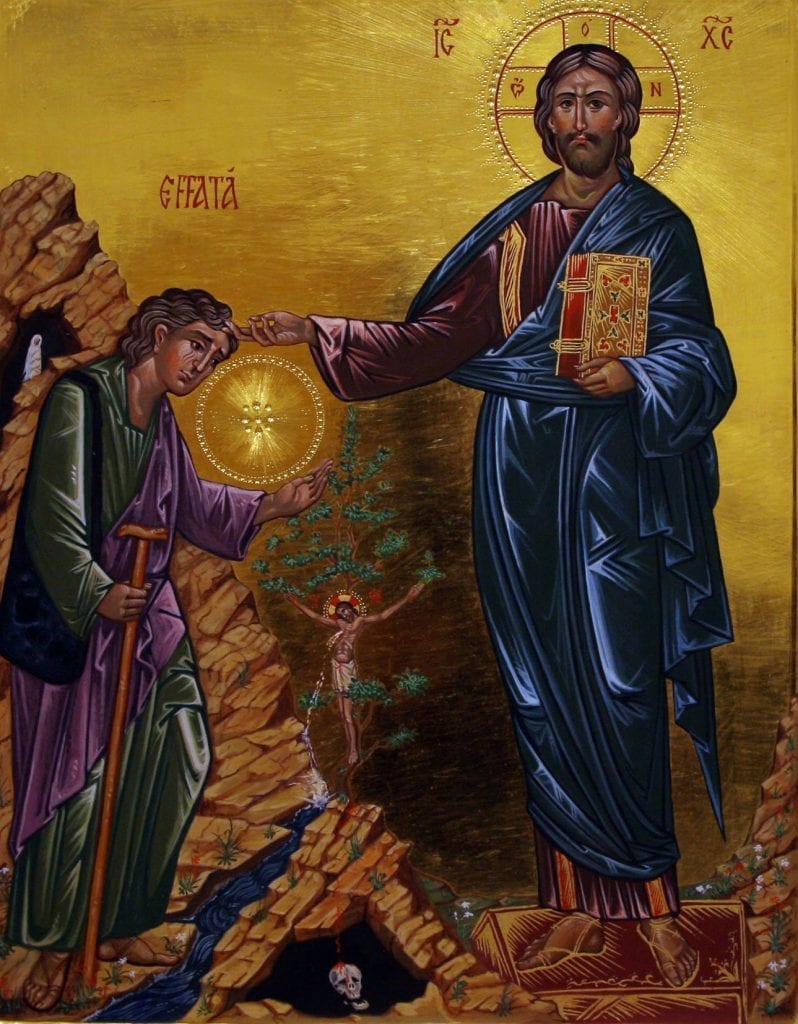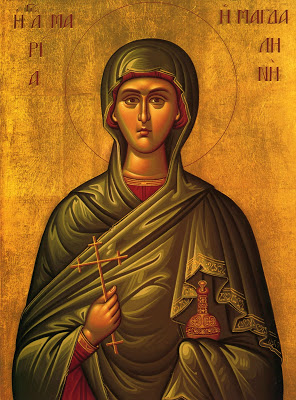HOMILY: Forgiveness Sunday – March 1, 2020
Readings: Matthew 6:14-21, Romans 13:11 – 14:4
In the name of the Father, and of the Son, and of the Holy Spirit. One god. Amen.
We have reached the end of our time of preparation, in which we prepare to embark on that great and spiritual endeavor of our sacramental lives: Great Lent. The focus of the days behind us have a shared theme and focus of humility and repentance, which is ultimately the spirit of the great fast; and, if we are being honest with ourselves, it is the underlying movement of the entire Christian life. We are to live our lives continually in repentance, which is the turning away from the world, the turning away from worldly things so that we may receive the Truth – the light of life – and the Joy of His salvation. But, in particular, the Great Fast is a time to commit ourselves more consciously, more fully, and more completely to the spirit of true repentance; for, “a broken and contrite heart God will not despise.” So, let our hearts be broken, and turn to the Lord our God.
Some of our hearts are broken, but not because of our sin. Some of our hearts are broken by others; some are broken by cruel memories that assail us; some are broken by wrongs committed against us; some are broken because of insult or injury; but, some are broken because they choose to stay broken, choosing anger over love, for “the memory of insults [or injury] is the residue of anger.”1 We must not allow the fire of anger to smolder in our hearts, and only the fire of God’s love can supplant it. As Saint Maximos the Confessor has said, “Do not befoul your intellect by clinging to thoughts filled with anger and sensual desire. Otherwise you will lose your capacity for pure prayer and fall victim to the demon of listlessness.” So we let go of anger, and forgive those who have wounded us, because it is only we who continue to be wounded by our memory of offense. We forgive because God forgives. We forgive, that we may be forgiven.
“For if you forgive men their trespasses, your heavenly Father will also forgive you. But if you do not forgive men their trespasses, neither will your Father forgive your trespasses.”
Matthew 6:14-15
Alexander Schmemann has said that “forgiveness is both the beginning of, and the proper condition for, the Lenten season.” So, it is then appropriate that we begin the great fast with forgiveness Sunday, “the day on which we acquire the power to make our fasting – true fasting; our effort – true effort; our reconciliation with God – true reconciliation.”2 It is the day where we as family, as brothers and sisters in Christ, as fellow heirs to the Kingdom of heaven, forgive each other of whatever offenses we may have caused one another, whether knowingly or unknowingly. It is the renewal of relationships, but it is also a renewal of ourselves. We cleanse our hearts and minds, our very souls, of any and all injuries that exist between we living stones of the living church; enforcing and strengthening her as we march forward together through the Lenten season towards Christ. So, in the words of Saint Macarius of Optina, “do not allow the spark of discord and enmity to smolder. The longer you wait, the more the enemy tries to cause confusion among you. Be watchful, so that he does not mock you. Humility destroys all of his schemes.”
Humility is the beginning of all virtue, and all virtue is necessary in the acquisition of the Holy Spirit, the primary aim of our Christian lives. Without humility there is no grace in us. Without humility there is no love, which is the fulfillment of the whole law. Without humility there is no prayer, and without prayer there is no spiritual life in us. Humility forms the foundation upon which all virtue is raised within us. Let us consider, “an angel fell from heaven without any other passion except pride, and so we may ask whether it is possible to ascend to Heaven by humility alone, without any other of the virtues.“3
With humility we approach the beginning of this Lenten season, with both humility and contrition of heart. We approach with the same humility of the public and the prodigal son, for we recognized our own sin, our own unworthiness to stand before the throne of God. We have contrition of heart, ever mindful of the dread judgement, where no hidden and secret thing will remain hidden in the light of God’s love. We begin our Lenten journey with prayers, for “if you are not successful in your prayer, you will not be successful in anything, for prayer is the root of everything”4
We pray because it is necessary for our spiritual lives. By prayer we unite the mind and heart, but also our minds and hearts with God. We pray that God’s will would be done in our lives, whatever that may be; but, we must be mindful of our prayer, and in our prayer also. Prayer consisting of words alone is of no assistance to us if the heart does not participate in it. Our prayer should become a state of being, for it is not enough to simply say the prayer, but we must also become our prayers. Our prayer and our lives should become two identical expressions of the same situation. “All of life, each and every act, every gesture, even the smile of the human face, must become a hymn of adoration, an offering, a prayer. One should offer not what one has, but what one is.” Then, through our prayer we offer ourselves up to God, for God must be the object of our prayer, our wanting, for the intensity and elation of our prayer is often about the object of our prayer rather than the one to whom our prayer is addressed. So, may we remember to pray without ceasing, for God never ceases to love us.
We fast, in addition to, and in conjunction with prayer, in order to train the body, to train ourselves in resisting the passions of the flesh. For, If we cannot resist even the smallest morsel of food, then we have no hope in battling whatever greater temptations that exist in our lives. Start with a small act of fasting, and your foundation of iniquity will erode and collapse as though a house built on sand. So, we fast from food to strengthen us in fasting from all things harmful and unneeded to our spiritual lives. Fasting is a means in which to practice self control on our path towards conquering the passions of the flesh. Fasting is an exercise of both penitence and sacrifice – for there is no love without sacrifice – which assists in conquering of self, and being more attentive to those in need. Yet, it is not about fasting from food alone, as Saint Basil the Great has said, for “true fasting lies in rejecting evil, holding one’s tongue, suppressing hatred and banishing one’s lust, evil words, lying, and betrayal of vows.” We fast from the poisoned fruits of this world, so that true spiritual fruits may grow in us.
We give Alms as a physical expression of God’s love in this world. Saint John the Golden mouthed has said that “to do alms is a work greater than miracles.” We give out of our excess created through our fasting. We give excessively out of pure love. When we saw the hungry, did we feed them? When we saw the poor, did we help them, or clothe them? When we met the stranger, did we invite them here? When we saw anyone in need, and we had the means to help them, did we do so? “Whoever knows the right thing to do, and does not do it, for him it is sin.” Saint Basil the Great also tells us:
“The bread you do not use is the bread of the hungry. The garment hanging in your wardrobe is the garment of the person who is naked. The shoes you do not wear are the shoes of the one who is barefoot. The money you keep locked away is the money of the poor. The acts of charity you do not perform are the injustices you commit.”
Saint basil the Great
It costs us nothing to give and do well unto others, for our wealth is not measured in this world; but, what we gain in doing so is priceless and without measure. What we lose in doing nothing is unthinkable.
So, we approach the lenten season with humility and repentance, wherein we pray, fast, and give alms. With humility we forgive and repent because death brings judgement, and we weep for our iniquities, for they are many. We pray, because by prayer alone our soul is given sufficient strength necessary to endure. We fast from food and the things of this world, that we may be freed from the fetters of our passionate lives. We give alms because we have been given all things, and nothing in this world belongs to us. We do all these things because we were embittered by Adam and Eve eating that forbidden fruit. We were embittered that paradise was closed to us, guarded by a flaming sword. We were embittered that life was abolished through death and the grave. We were embittered that we were enslaved by sin. We partook of pride and put on death, having forsaken life. We were given paradise, and chose the world; we were given heaven, and descended into hades; we were adopted as Sons and daughters of the living God, and instead lived as sons of man. We encountered the Evil One and and forsook heaven. We took that which was seen and forsook the unseen. We gave up life and our likeness to God, and commuted our bodies to dust.
Let us return to life by returning our life to Him who gave us life. Our life – eternal life – is a Gift given to us freely, through the healing of soul and body. Though, it is in love that we give our lives – our temporal lives – back to God, for it is the only gift that we can give that is equal to the one received. “Indeed, Christianity has no other content but love. And it is primarily the renewal of that love, a growth in it, that we seek in Great Lent, in fasting and prayer, in the entire spirit and the entire effort of that season.”
By the prayers of our holy fathers, and all the saints, Lord Jesus Christ our God have mercy on us and save us.
Amen.
CITATIONS:
1 – Saint John Climacus – The brackets are my addition.
2 – Forgiveness Sunday – Alexander Schmemann.
3 – “The Ladder of Divine Ascent,” (Boston: Holy Transfiguration Monastery, 1978),STEP 23: On Mad Pride, and, in the Same Step, on Unclean Blasphemous Thoughts
4 – Theophan the Recluse,, The Art of Prayer










